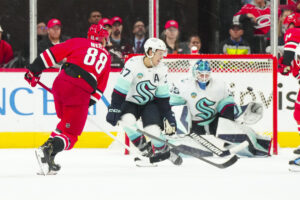The Boston Bruins have salary cap issues. After the salary cap went up to only $81.5 million, instead of what had been expected to be $83 million, the Bruins find themselves in an awkward situation. With two restricted free agent defencemen in Charlie McAvoy and Brandon Carlo still to sign, and just over $8 million in cap space, Boston has to be creative. What are the possible Boston Bruins salary cap solutions? We take a look at four of those.
Possible Boston Bruins Salary Cap Solutions
According to CapFriendly, the Bruins have the salary cap space of $8,103,334 per But this outlook counts with currently 25 players on the roster. Since only 23 men can be included on the NHL roster to open the season, the Bruins can clear some space when players are sent to the AHL after training camp. This should give them a little over $10 million in space. However, a team can also not use every penny before the season as room will be needed for in-season injury replacements. Even this extra space is not yet sufficient for the signings needed.
The Boston Bruins salary cap issues are to be expected. Not many teams make the Stanley Cup Final and emerge without having some salary cap questions. That said, the Bruins can still solve it with grace or at least with no big damage suffered. Last week, the Bruins signed restricted free agent forward Danton Heinen to a two-year contract with a $2.8 million AAV. Earlier in July, the Bruins managed to ink Brett Ritchie, Par Lindholm, and Steven Kampfer. Those three ate up almost $3 million of the salary cap space.
McAvoy and Carlo are coming off their three-year entry-level deals. Emerging as arguably the team’s best defenceman, McAvoy could be looking for over $8 million per year. Carlo should come in for less but has earned a healthy raise over the less than $1 million AAV on his ELC. Boston will need some cap creativity to free up significant cap space. We take a look at some reasonable solutions, but also at some very delicate ones.
David Backes
The first name coming on this list has to be David Backes. His contract is currently a pain in the stomach for the Bruins organization. It is pretty clear the Bruins committed a huge mistake three years ago. In an off-season where Milan Lucic, Loui Eriksson, Kyle Okposo and Andrew Ladd were given big paydays, the Bruins gave Backes a big deal. He is now a player who often finds himself in the press box as a healthy scratch. Backs also has two years remaining on his contract with an AAV of $6 million.
The Boston Bruins salary cap concerns could be solved if they get rid of Backes contract. That is easier said than done though. After the Heinen contract, the Bruins have until Tuesday to buyout David Backes. However, a Backes buyout would not help much as the Bruins would still take a $5.667 million cap hit in 2019-20. They would also have a $3.67 million cap hit in 2020-21, and then a $666,667 cap hit in each of the following two years.
The Bruins have to be creative. Trading David Backes is possible, just look at the Patrick Marleau deal. Do the Bruins want to give up a first-round draft pick in that deal? To this day, general manager Don Sweeney regrets giving up a first-round draft choice in the Rick Nash deal. Also, Backes has submitted a modified no-trade clause and can only be traded to eight teams. Of course, he can still waive protection on trades to the other 22 teams upon request.
Sending David Backes to Providence for the 2019-2020 season would save Bruins just over $1 million against the cap. That´s actually better than a buyout. The Bruins can explore the option of trading Backes in the less painful package while retaining up to 50% of his salary.
Veteran Defencemen
The Boston Bruins salary cap issues may be solved in a different way. Kevan Miller has a salary cap hit of $2.5 million per season. The 32-year-old has one year left on his deal. If the Bruins don’t want (or cannot afford) to keep him, they should trade him now. Last year, the Bruins traded Adam McQuaid for draft picks and Steven Kampfer from the New York Rangers. Boston might explore a similar deal involving Miller this year.
Another casualty might be John Moore. His cap hit is at $2.75 million per year for four more campaigns. Some teams might use his services. Trading one of these defencemen would probably deliver the Bruins much-needed salary cap relief. Another strong argument for the Bruins to trade one of them, maybe even both, in the near future, is that they are not projected to start the year in the lineup. The third defensive pair of Matt Grzelcyk and Connor Clifton looked really good in last year’s playoffs.
Big-time Trade
A reasonable trade of a veteran defenceman or a painful one of David Backes. But a deal consisting of a big piece might occur as well. Torey Krug has just one year left on his contract worth $5.25 million per season. Krug has collected 163 points over the last three seasons and that propels him to the fifth-best in such a category. If the Bruins aren’t ready, or again, cannot afford, to re-sign Krug to a contract extension they have to explore trading him.
The next player to consider is David Krejci. Krejci, often criticized, had a season to remember last year. In the playoffs, the Czech centre added another 16 points. He is a useful player even though he is now 33-years-old. A trade would again save another huge chunk of salary cap space. With a salary cap hit of $7.25 million per year, he will become an unrestricted free agent in 2021. Whether it´s now or next summer, the Bruins have to make future plans for Krejci. Will they extend the 35-year-old in 2021, or promote one of their prospects to a top-six centre role.
Making Reasonable Moves Without Making Noise
After discussing some pricy moves, some reasonable ones, and some prominent ones, the Bruins still can create the salary cap space without making big noise. Charlie McAvoy and Brandon Carlo might both sign bridge deals and give the Bruins time to solve their issues. If they signed cheaper deals for two years, the Bruins would just move that problem to 2021. That´s the year when Backes, Krejci, and Tuukka Rask will be unrestricted free agents.
Trading away fourth liners like Joakim Nordstrom and/or Chris Wagner combined with sending Backes down to Providence in the AHL would save more than $2 million. Trading Kevan Miller looks like a must based on his contract situation. Both Miller and Moore are projected to start the year on the long-term injured reserve. With that being said, the Bruins might gain some time with this.
Either this scenario or the other one, there are options left for the Bruins. That´s also a reason why we might wait a little bit more to see McAvoy and Carlo signing new contracts. The Bruins are trying to discover the best available, and the least painful, solution.
Main Photo:






